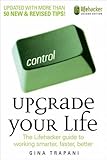Good point from David Allen in Ready for Anything:
In golf and tennis, too firm a grip can cause you to “choke” a shot. Hanging on too tightly can limit your ability to deal with things from the most productive perspective. Micromanaging — getting too wrapped around the axles of life and work — can be a seductive trap in getting things done. Fine points are fine, as long as there’s a point. (p. 122)
In other words, if you try to control too much, you actually lose control. As in tennis, so also in productivity: too tight of a grip will cause you to choke.
Allen touches on this in his latest book, Making It All Work, as well:
If your grip is too tight on a golf club, you will lose control of your swing. If your rules are too strict for your kids, they will rebel. A boxer or karate master will attempt to coax his opponent to fear losing control, which causes the opponent to tense up and overreact. (The tactic is called a “fake.”) If your policies and procedures are draconian, you will wind up only stifling creativity, flexibility, and momentum in your environment. (p. 65)
A key part of the solution is to realize that utilizing a disciplined approach to productivity, such as GTD, doesn’t relieve you of the work of having to think about your work. As Allen writes:
Once people catch on to the power of organization per se, they sometimes go too far and try to microorganize everything: “Let’s create a system so you won’t have to think at all!” But it can’t be done. My systems do indeed relieve the mind of the tasks of remembering and reminding as much as I can, but they don’t replace the need for regular executive thinking about my stuff. … You must still engage your mind, your intelligence, and your vision to integrate those moving parts into the whole of how you interact with your world.
Interestingly, the concept of being over controlled has implications for organizational and management productivity as well. For, as Allen alludes to in one of the above quotes, if an organization tries to tie everything up with very detailed policies, the result is often that creativity and momentum are killed.
In this regard, Marcus Buckingham gets at the solution in First, Break All the Rules: What the World’s Greatest Managers Do Differently: Good managers define the right outcomes, but leave it up to each employee to find the best way there. That brings together both the need for clear expectations with the equally important need for freedom and empowerment.
In both the realms of managing others and managing yourself, too controlled is out of control. When managing others, work with people to define the right outcomes, but leave the methods to them. When managing yourself, define your outcomes (projects) and the best next steps to carry them forward (next actions), but once you’ve done this, don’t think that you’re on autopilot. Rather, that is when another level of thinking needs to begin about how to integrate what you have to do into the reality of your ongoing, ever-changing daily environment.
